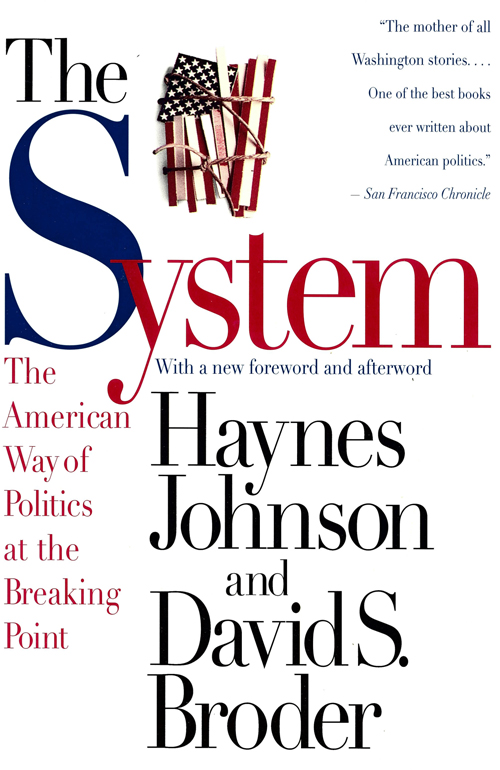Sets a new standard for inside, in-depth reporting. Johnson and Broder understand Washington; they know the System, how its supposed to work, how it did work, and how it was stopped cold. An exciting blow-by-blow history, a textbook for the voters and politicians in democracys next century.
Benjamin C. Bradlee, author of A Good Life
With its large cast of power brokers and ideological clashes, The System reads like an epic novel.
Chicago Tribune
The end result of the ideal combination two of the nations best reporters covering one of the nations best stories. Haynes Johnson and David Broder have told of a monumental struggle in a way that matters. A superior achievement in reporting and insight.
Jim Lehrer, The NewsHour with Jim Lehrer
With this reporting and analysis, Mr. Johnson and Mr. Broder make a valuable contribution to the debate over the state of our public life.
New York Times Book Review
Revealing.... Johnson and Broder pinpoint many actors responsible for the defeat of health care reform, but even they seem startled by the power and skill of the most influential players on the field: national lobbyists.
David Gergen, U.S. News &World Report
Offers telling insights into the American political condition at decades end. It clearly surpasses all journalistic treatments of the Clinton presidency now in print.
Detroit Free Press
This is the mother of all Washington stories, and it is superlatively told by Haynes Johnson and David Broder.... One of the best books ever written about American politics.
San Francisco Chronicle Rook Review
Divided We Fall
Sleepwalking Through History
In the Absence of Power
The Working White House
Lyndon (with Richard Harwood)
Army in Anguish (with George C. Wilson)
The Unions (with Nick Kotz)
Fulbright: The Dissenter (with Bernard M. Gwertzman)
The Bay of Pigs
Dusk at the Mountain
FICTION
The Landing
(with Howard Simons)
ALSO BY DAVID S. BRODER
The Man Who Would Be President: Dan Quayle (with Bob Woodward)
Behind the Front Page
Changing of the Guard
The Partys Over
The Republican Establishment
(with Stephen Hess)
Haynes Johnson and David S. Broder have worked together for more than thirty years as reporters and columnists at the Washington Post and earlier the Washington Star. A number of their books have become bestsellers. Both men are familiar to television viewers of such programs as Washington Week in Review, Meet the Press, and The NewsHour with Jim Lehrer. Broder, a native of Chicago Heights, Illinois, holds a masters degree in political science from the University of Chicago. He won the Pulitzer Prize for distinguished commentary in 1973. Johnson, a native of New York, holds a masters degree in American history from the University of Wisconsin. He won the Pulitzer Prize in 1966 for distinguished national reporting of the civil rights struggle in Selma, Alabama.
Copyright 1996, 1997 by Haynes Johnson and David S. Broder
All rights reserved. No part of this book may be reproduced in any form or by any electronic or mechanical means, including information storage and retrieval systems, without permission in writing from the publisher, except by a reviewer who may quote brief passages in a review.
The authors are grateful for permission to include the previously copyrighted material:
Excerpt from Congressional Quarterly by Phil Kuntz. Reprinted by permission of Congressional Quarterly, Bob Merry, executive editor.
Hachette Book Group
237 Park Avenue
New York, NY 10017
Visit our website at www.HachetteBookGroup.com
First eBook Edition: October 2009
ISBN: 978-0-316-08395-9
For our families
And their American future
Victory has one hundred fathers
and defeat is an orphan.
John F. Kennedy,
after the failure of the Bay of Pigs invasion
There is nothing more difficult to carry out,
nor more doubtful of success, nor dangerous to handle,
than to initiate a new order of things. For the reformer
has enemies in all these who profit by the old order,
and only lukewarm defenders in all those who would profit
by the new order...
Machiavelli
W HAT FOLLOWS IS A NARRATIVE history of a great failure, a failure of politics, of policy, and of public will, with serious consequences for the American future. As such, it symbolizes a greater failure at the heart of our story: the inability of the U.S. system of government and politics to deal with critical issues that affect the lives of all citizens. Our story focuses on one of those issues, providing affordable health care for all Americans. The crushing defeat of Bill Clintons health reform plan after a ferocious battle during the first two years of his administration directly led to the takeover of Congress by Republicans for the first time in forty years and triggered an even greater struggle over reversing the role and power of the federal government in American life. It then formed the background for the presidential election of 1996, which left power sharply divided between a Democratic President and a Republican Congress. Now, in these closing years of the century, that highly charged condition presents The System with a historic challenge: to demonstrate it can work cooperatively to resolve national problems in the public interest. That remains a daunting task; the health care issue alone poses an even more urgent problem for the nation than when Clinton first attempted to resolve it. Thus the stakes are greater than when we began to chronicle this story four years ago, for another failure almost certainly will lead to greater public disgust and political turmoil.
H.J. and D.S.B.
January 1997
B EFORE BEGINNING THIS CHRONICLE, we owe readers a statement about our motives and goals. In the years we have reported on American politics and government, the United States has advanced from a segregated society to a freer, fairer, more prosperous nation. For all its failings, over those years The System of government and politics the presidency, the Congress, the political parties, the lobbyists, the press and the men and women who served in it have forged a proud record of progress for the American people. But by the nineties, faith in The System had been seriously shaken. We saw a System buffeted by divisive political forces, a people deeply disillusioned with their government, a country experiencing radical change, a society less fair in dealing with its poor, its ill, and its disabled. Against that background we undertook a deeper examination of the way The System really works. We asked ourselves and all those we interviewed to reflect on this historic moment and to address a greater question at the heart of our story: In these closing years of the century, a time of unprecedented stresses on government, growing cynicism about politicians and institutions, rising clamor for third parties and independent presidential candidacies, and increasing power of private interests to manipulate public opinion and political events, how well does The System serve the people?
To illuminate that question, for three years, from 1993 through 1995, we watched as an epic battle was waged in Washington and around the country. When it was over, the nations political system had been shaken to its foundation and the forces of reform routed. Politically, America veered sharply to the right, setting the stage for a historic debate in the 1996 presidential election, the last of the century, about the role and purposes of government as significant as any since the New Deal. The consequences of this battle were felt in the lives of each American family and in the U.S. economy. They will continue to affect all parts of The System.









